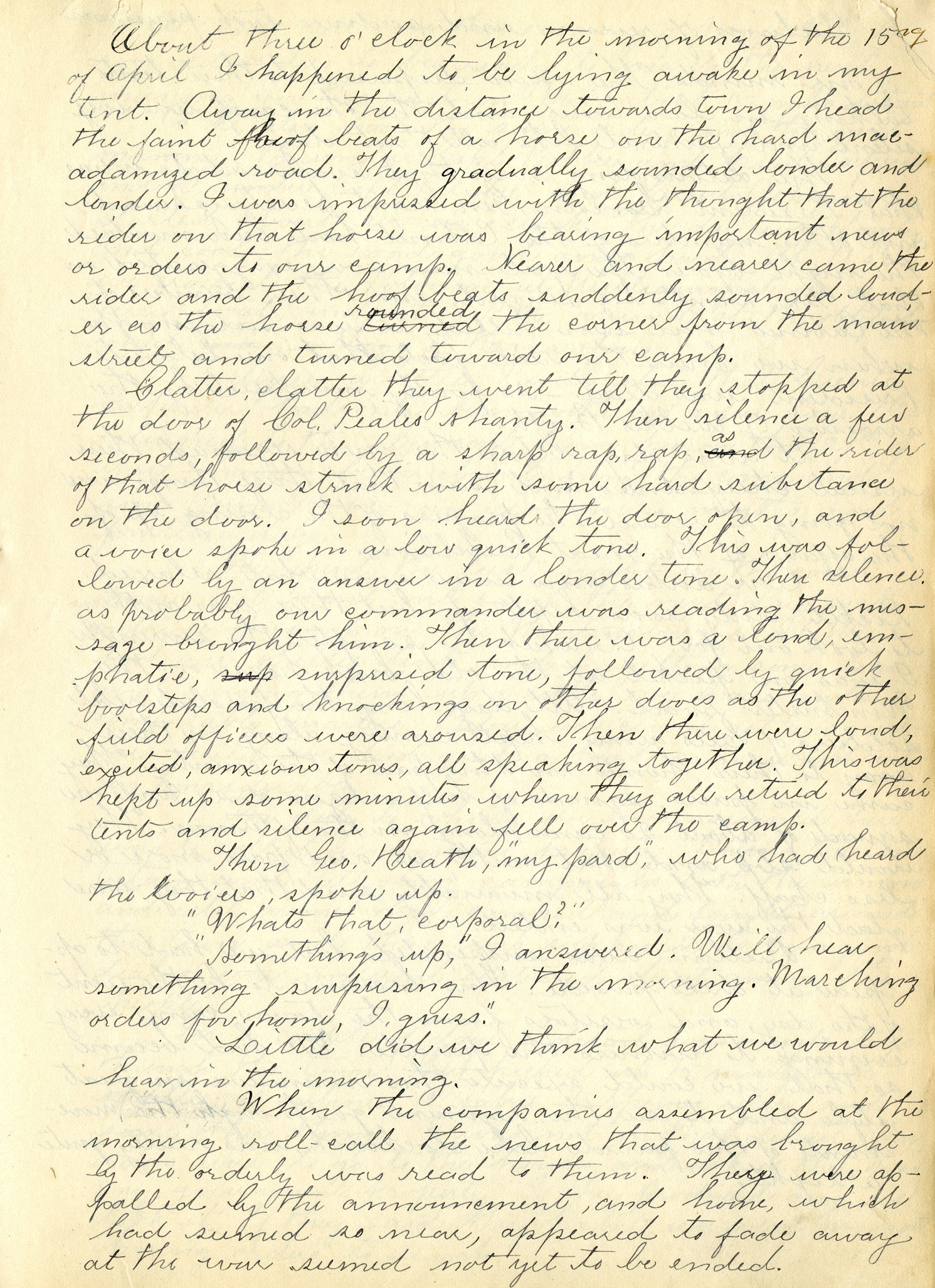Diary from Aug. 6, 1862
Record Book of James H. Sawyer, 1862-1865
-
Full Title
Record Book of James H. Sawyer, 1862-1865
-
Description
Excerpt from the diary of James H. Sawyer (b.1843), a resident of Woodstock, CT and a soldier in the 18th Regiment of Connecticut Infantry. This excerpt describes the somber mood in Sawyer's camp upon learning of Abraham Lincoln's death. It also describes how the camp was alerted of Lincoln's death.
-
Transcription
Record Book of James H. Sawyer:
About three o’clock in the morning of the 15th
of April I happened to be lying awake in my
tent. Away in the distance towards town I heard
the faint hoof beats of a horse on the hard mae-
adaized road. They gradually sounded louder and
louder. I was [[impeded]] with the thought that the
rider on that horse was bring important news
or [[?]] to our camp. Nearer and nearer came the
rider and the hoof beats suddenly sounded loud-
er as the horse rounded the corner from the main
street and turned towards our camp.
Clatter, clatter they went till they stopped at
the doors of Col. Peales shanty. Then silence a few
seconds, followed by a sharp rap, rap, as the rider
of that horse struck with the same hard substance
on the door. I soon heard the door open, and
a voice spoke in a low quick tone. This was fol-
lowed by an answer in a louder tone. Then silence
as probably our commander was reading the mes-
sage brought to him. Then there was a loud, em-
phatic, surprised tone, followed by quick
footsteps and knockings on other doors as the other
field offices were around. Then there was a new loud,
excited, anxious tones, all speaking together. This was
kept up some minutes when they all retired to their
tents and silence again fell over the camp.
Then Geo. Heath, “my pard,” who has heard
the voices, spoke up.
“What’s that, [[corporal]]?”
“Something’s up,” I answered. “We’ll hear
something surprising in the morning. Marching
orders for home, I guess.”
Little did we think what we would
hear in the morning.
When the companies assembled at the
morning roll-call the news that was brought
by the orderly was read to them. They were ap-
palled by the announcement, and home which
had seemed so near, appeared to fade away
at the war seemed not yet to be ended.
[[end page]]
[[start page]]
Feelings of revenge and sadness took passion
of our minds. The men dispersed to their tents
talking in low tones and the camp was very
silent and funeral like all that day.
The astounding news that was read to us was
that President Lincoln, Gen Grant Secretary Seward
and other numbers of the Cabinet had been murdered
the night before. The real news were exaggerated in
that Gen. Grant-Sec Seward and the other members of
the Cabinet had been killed; it was sad enough
when we knew the real facts that our beloved
President was dead-so fouly murdered by the
assassin J. Wilkes Booth.
It was days before the men regained their
usual cheerfulness and saw that these things were
not going to retard the progress of the closing up of
the affairs of the Great Rebellion.
Our duties now were somewhat relaxed.
Picket duty was kept up but there was nothing
to look out for. A week or so after the surrender
I was on picket at the old brick house on the
Winchester road. All day long the [[?]] rebel
soldiers of [[Lu’s]] army kept coming along on their
way to their homes in this part of the country. They
came in [[?]], squads of half a dozen or so, and one
squad of about 20 came along in the afternoon. They
would stop and chat with us and pass more or
less chaff. They all measurably said that they were
glad the war was ended.
Drilling was suspended but we had to ap-
pear at [[?]] parade. This became to be the event
of the day, and [[?]] from the town came every
evening to witness the parade. We had become
so that we could execute the maneuver in great
style and to see the regiment go through the move-
ments at this parade like clockwork, was really quite
a sight.
[Transcription by: Karsen O'Rourkr, Rachel Engl’s class, Lehigh University.]
-
Source
Ms 96780
-
Rights
Use of this item for research, teaching and private study is permitted with proper citation and attribution to the Connecticut Historical Society. Reproduction of this item for publication, broadcast or commercial use requires permission. For permission, please contact the Connecticut Historical Society at chs.org/research/digital-reproductions.
-
Cite this Item
James H. Sawyer. "Record Book of James H. Sawyer, 1862-1865". Remembering Lincoln. Web. Accessed February 13, 2026. https://rememberinglincoln.fords.org/node/863
-
Item Type
-
Creator
James H. Sawyer
-
Date
1862-1865
-
Material
paper, pen on ink
-
Dimensions
32cm x 21cm
-
Region
Diary from Aug. 6, 1862
Record Book of James H. Sawyer, 1862-1865

-
Description
Excerpt from the diary of James H. Sawyer (b.1843), a resident of Woodstock, CT and a soldier in the 18th Regiment of Connecticut Infantry. This excerpt describes the somber mood in Sawyer's camp upon learning of Abraham Lincoln's death. It also describes how the camp was alerted of Lincoln's death.
-
Source
Ms 96780
-
Rights
Use of this item for research, teaching and private study is permitted with proper citation and attribution to the Connecticut Historical Society. Reproduction of this item for publication, broadcast or commercial use requires permission. For permission, please contact the Connecticut Historical Society at chs.org/research/digital-reproductions.
-
Creator
James H. Sawyer
-
Date
August 6, 1862
-
Material
paper, pen on ink
-
Dimensions
32cm x 21cm
